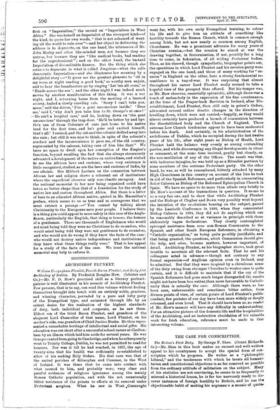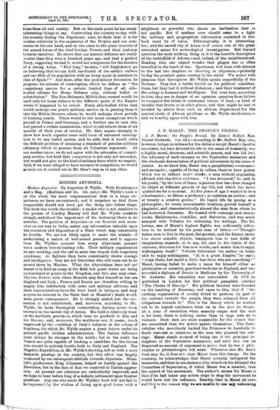THE CASE FOR CONSCRIPTION.
The Briton's First Duty. By George F. Shea. (Grant Richards. es.)—Mr. Shea in this book makes an earnest and well. written appeal to his countrymen to accept the special form of con- scription which he proposes. He writes as a "philosophic Liberal," and the tenderness with which he treats all humani- tarian and constitutional objections is as far removed as possible from the ordinary attitude of militarism on the subject. Many of his statistics are not convincing, he seems to us frequently to misread a historical lesson, he is far too nervously ready to dis- cover instances of foreign hostility to Britain, and he has the objectionable habit of making his arguments a mosaic of quota-
Cons from all and sundry. But on the main point he has many interesting things to say. Contrasting the country to-day with the country during the Napoleonic wars, he finds that it is far weaker relatively to the expansion of the Braiiire and our com- merce on the one hand, and on the other to the great increase of the armed forces of the chief foreign Powers and their jealousy towards ourselves. He shows that our natural defences are really weaker than they were a hundred years ago, and that a perfect Navy, supposing we had it, would not compensate for the absence of a strong Army. " How long," he asks, "will Englishmen go on believing that we can hold one-fourth of the earth's surface and one-fifth of its population with an Army equal in numbers to that of Spain ? " And then, after the preliminary discussion, he proposes his scheme of conscription, which he defines as "the compulsory service for a certain limited time of all able- bodied citizens for Home Defence only, without ballot or • substitution." The Pan-Britannic Militia thus created would be used only for home defence in the different parts of the Empire where it happened to be raised. Every able-bodied white man would undergo one year's military service in it, passing from it into the Militia Reserve, where he would undergo short periods of training yearly. There would be the usual exemptions which • prevail in France and Germany, and a further one to men who had passed a certain examination, which would relieve them of six months of their year of service. Mr. Shee argues strongly to show how much superior some mild form of universal conscrip- tion is to any ballot system, and he adds that it would solve the difficult problem of attaining a standard of genuine military efficiency which at present faces all Volunteer regiments. As our readers know, we do not agree with the advocates of compul- sory service, but hold that compulsion is not only not necessary, butwould not give us the kind of military force which we require. Still, if we were obliged to have recourse to compulsion, we would as soon see it carried out in Mr. Shee's way as in any other.























































 Previous page
Previous page